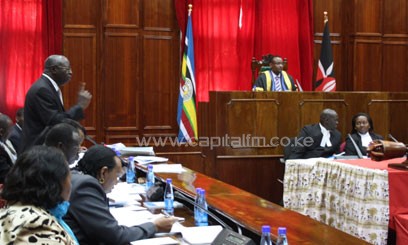
Peter Mathuki and Saoli Ole Nkanai argue that the cost of labour mobility will reduce if work permit fees are removed/FILE
Peter Mathuki and Saoli Ole Nkanai argue that the cost of labour mobility will reduce if work permit fees are removed.
“We believe that when we develop this sense of East Africanness, and move away from defining ourselves as ‘us’ and ‘them’, and all of us become ‘us’, then we would have enhanced and deepened this project we call integration,” he said.
All the partner States of Kenya, Uganda, Rwanda, Tanzania and Burundi are required by Article 10 of the EAC Common Market Protocol to waive work permits in favour of free movement of labour in the region.
He commended Rwanda and Kenya for being the first among the member states to sign a bilateral agreement abolishing work permits, a move that has seen many Kenyans flocking to Rwanda in search of employment and establishment of small businesses which are now competing mostly in the service sector.
Ole Nkanai described the move to remove work permit fees as “timely, necessary, and desired”.
The MPs were briefing the media on the Assembly in Kigali, which among others debated and approved the One-Stop Border Posts Bill.
“The OSBP has been operating on some border points on bilateral arrangements within the Partner States; therefore the law is critical because it provides a regional legal framework,” he said.
He however noted that there also remains a challenge of implementation.
The object of the Bill, initiated by the EAC Council of Ministers, is to provide for the establishment of One Stop Border Posts (OSBP) in the Community in order to facilitate trade through an efficient movement of goods and people within the Community.
Under the arrangement, Partner States shall implement one stop border processing arrangements by establishing and designating control zones at the respective border posts. The Bill in addition seeks to extend Partner States’ national laws relating to border control officers of adjoining Partner States, permitting their free movement within the controlled zone(s) in the performance of their duties, without producing passports, but by simply producing their appropriate identity.
The Bill makes provision for the application of border control laws and provides for institutional arrangements in the co-ordination and monitoring of the one stop border posts. In so doing, however, the Bill does not affect the rights of any adjoining Partner State(s) to take temporary measures in the interest of defence, security, public safety and public order.
Common Border posts designated in the EAC as One Stop Border Posts include the Taveta-Holili border and the Namanga border (Kenya- United Republic of Tanzania), Busia and Malaba borders (Kenya – Uganda) and the Kanyaru-Akanyaru border (Burundi-Rwanda).
Others are the Mutukula border (United Republic of Tanzania- Uganda), Gasenyi-Nemba border (Burundi, Rwanda) and Lungalunga-Horohoro border (Kenya – United Republic of Tanzania).









































